Abstract
The effects of repeated diazepam administration (80 mg) were assessed across a 12-hr time course with humans responding under a two-component multiple schedule of repeated acquisition and performance of response sequences. Subjects resided in an inpatient clinical research ward for the duration of the study. In each component of the multiple schedule, subjects completed sequences of 10 responses in a predetermined order using three keys of a numeric keypad. In the acquisition component, a new response sequence was to be acquired each session. In the performance component, the response sequence always remained the same. After stable responding was obtained and the effects of the placebo assessed, diazepam was administered for 3 consecutive days. The effects of repeated diazepam administration on overall percentage of errors across the two components of the multiple schedule were selective. In the acquisition component, the first dose of diazepam increased percentage errors with the magnitude of effects decreasing across the second and third days of diazepam administration. In the performance component, the percentage of errors was either minimally affected across all 3 days of diazepam administration or substantively increased on Day 1 with subsequent diazepam administrations having minimal effects. Effects on response rate were not selective. Diazepam decreased rates of responding in both schedule components, with the magnitude of effects decreasing across successive administrations. These results replicate previous findings in humans and nonhumans on the selective effects of diazepam on acquisition versus performance baselines. Also, the results suggest that the selective effects do not result from differences in reinforcement rate. Finally, the present results demonstrate that the selective recovery from repeated drug administration previously demonstrated in nonhumans using a repeated acquisition arrangement has generality to human behavior.
Full text
PDF


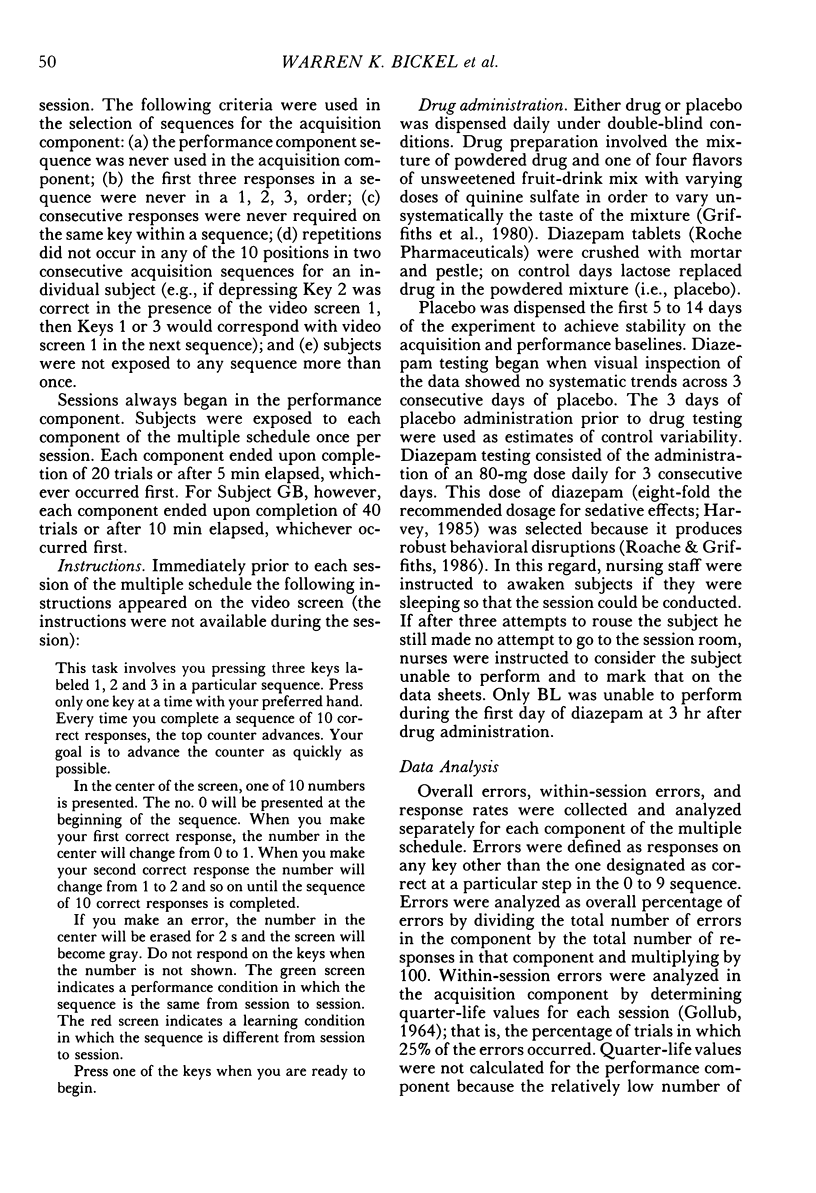
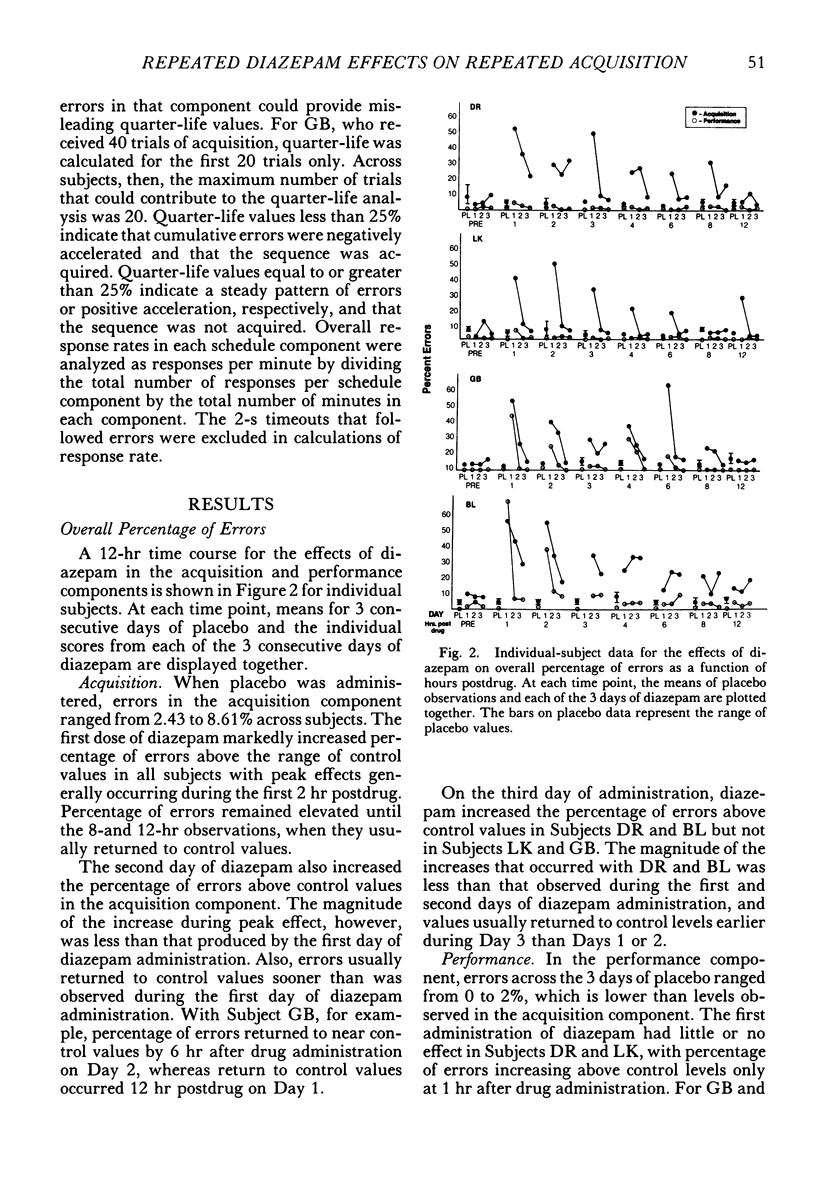


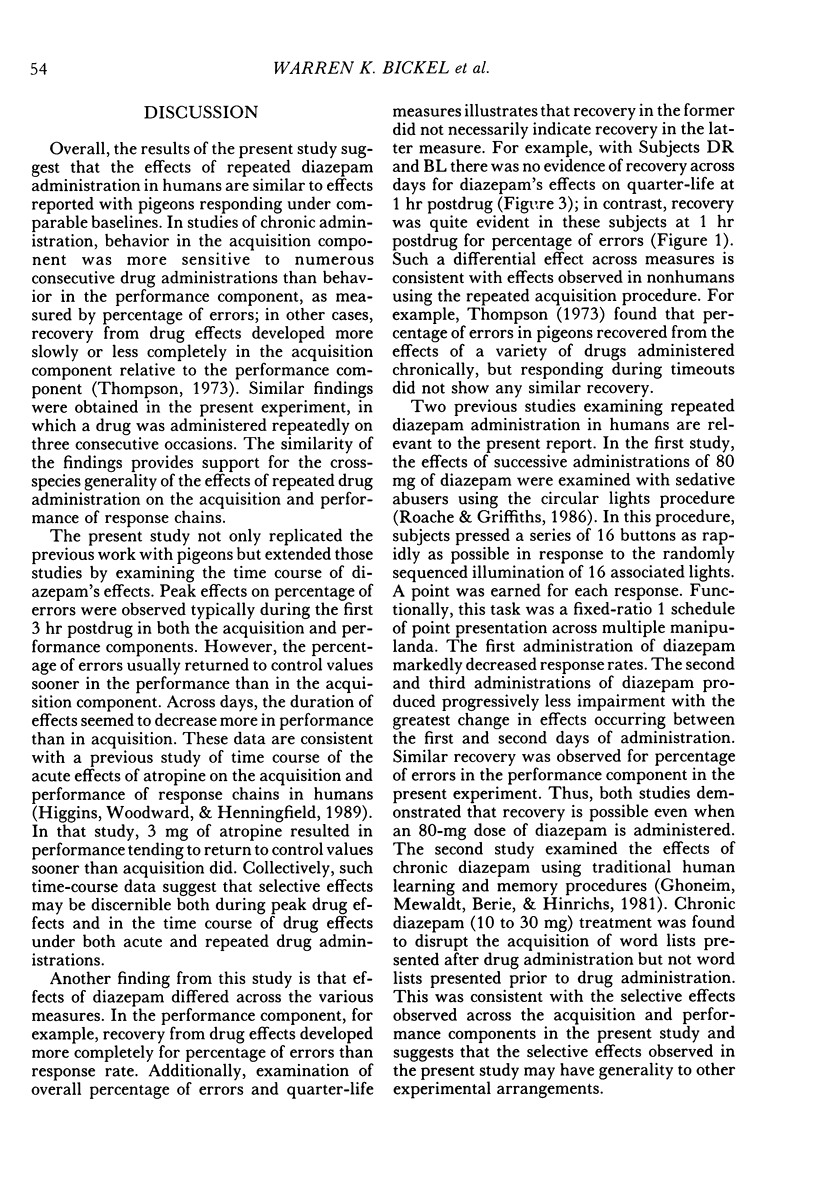
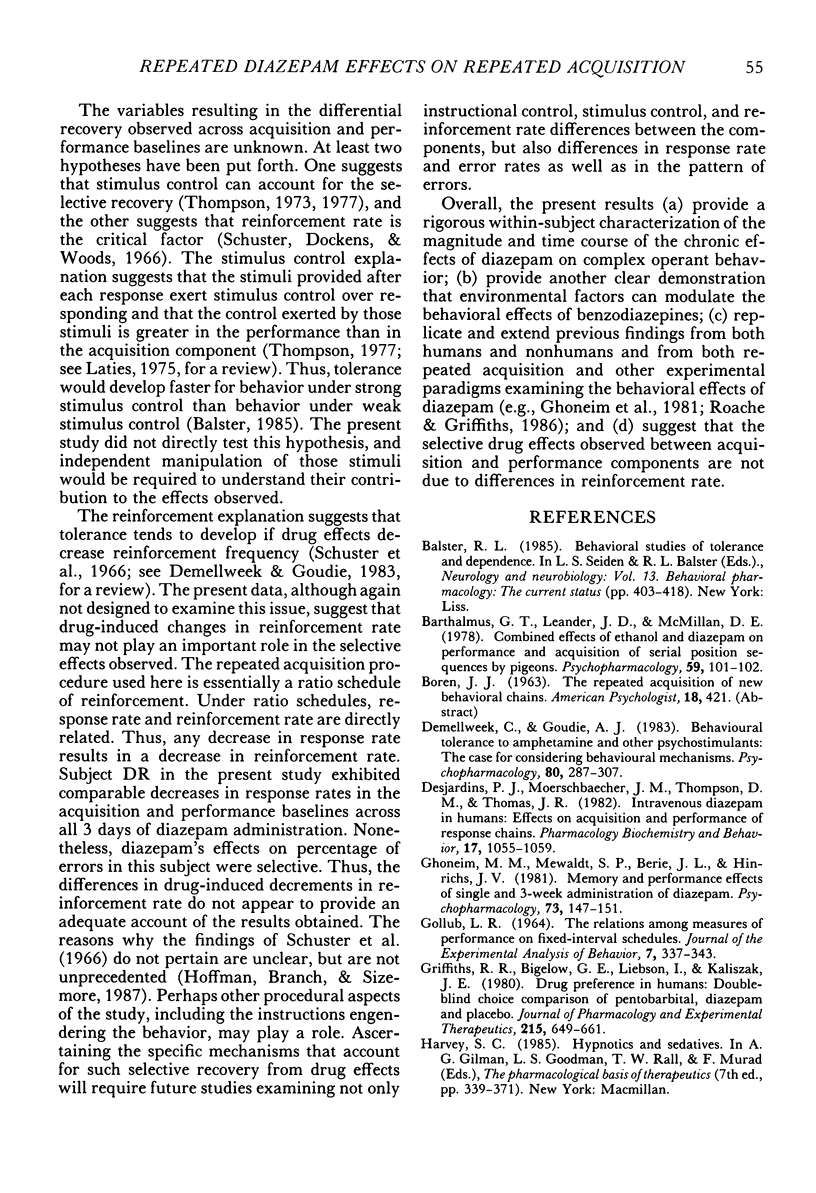
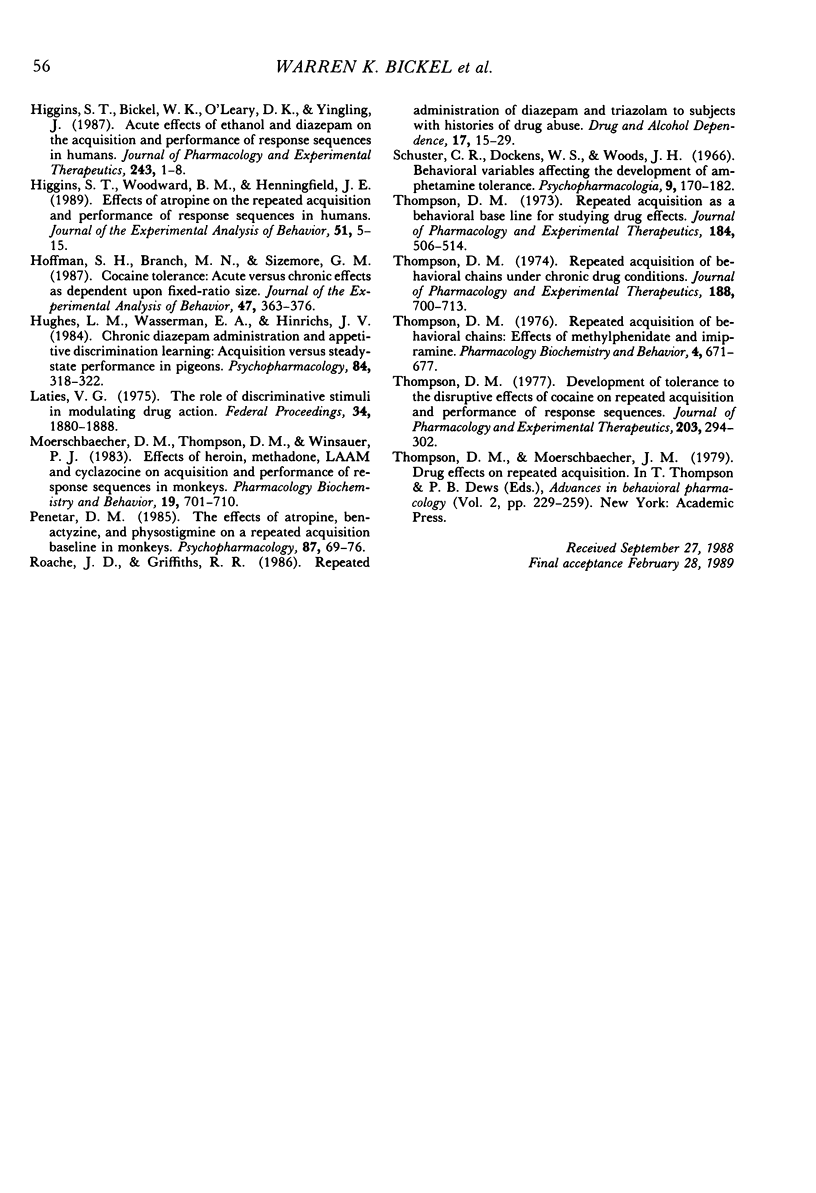
Selected References
These references are in PubMed. This may not be the complete list of references from this article.
- Barthalmus G. T., Leander J. D., McMillan D. E. Combined effects of ethanol and diazepam on performance and acquisition of serial position sequences by pigeons. Psychopharmacology (Berl) 1978 Sep 15;59(1):101–102. doi: 10.1007/BF00428039. [DOI] [PubMed] [Google Scholar]
- Demellweek C., Goudie A. J. Behavioural tolerance to amphetamine and other psychostimulants: the case for considering behavioural mechanisms. Psychopharmacology (Berl) 1983;80(4):287–307. doi: 10.1007/BF00432109. [DOI] [PubMed] [Google Scholar]
- Desjardins P. J., Moerschbaecher J. M., Thompson D. M., Thomas J. R. Intravenous diazepam in humans: effects on acquisition and performance of response chains. Pharmacol Biochem Behav. 1982 Nov;17(5):1055–1059. doi: 10.1016/0091-3057(82)90493-2. [DOI] [PubMed] [Google Scholar]
- GOLLUB L. R. THE RELATIONS AMONG MEASURES OF PERFORMANCE ON FIXED-INTERVAL SCHEDULES. J Exp Anal Behav. 1964 Sep;7:337–343. doi: 10.1901/jeab.1964.7-337. [DOI] [PMC free article] [PubMed] [Google Scholar]
- Ghoneim M. M., Mewaldt S. P., Berie J. L., Hinrichs J. V. Memory and performance effects of single and 3-week administration of diazepam. Psychopharmacology (Berl) 1981;73(2):147–151. doi: 10.1007/BF00429206. [DOI] [PubMed] [Google Scholar]
- Griffiths R. R., Bigelow G. E., Liebson I., Kaliszak J. E. Drug preference in humans: double-blind choice comparison of pentobarbital, diazepam and placebo. J Pharmacol Exp Ther. 1980 Dec;215(3):649–661. [PubMed] [Google Scholar]
- Higgins S. T., Bickel W. K., O'Leary D. K., Yingling J. Acute effects of ethanol and diazepam on the acquisition and performance of response sequences in humans. J Pharmacol Exp Ther. 1987 Oct;243(1):1–8. [PubMed] [Google Scholar]
- Higgins S. T., Woodward B. M., Henningfield J. E. Effects of atropine on the repeated acquisition and performance of response sequences in humans. J Exp Anal Behav. 1989 Jan;51(1):5–15. doi: 10.1901/jeab.1989.51-5. [DOI] [PMC free article] [PubMed] [Google Scholar]
- Hoffman S. H., Branch M. N., Sizemore G. M. Cocaine tolerance: acute versus chronic effects as dependent upon fixed-ratio size. J Exp Anal Behav. 1987 May;47(3):363–376. doi: 10.1901/jeab.1987.47-363. [DOI] [PMC free article] [PubMed] [Google Scholar]
- Hughes L. M., Wasserman E. A., Hinrichs J. V. Chronic diazepam administration and appetitive discrimination learning: acquisition versus steady-state performance in pigeons. Psychopharmacology (Berl) 1984;84(3):318–322. doi: 10.1007/BF00555206. [DOI] [PubMed] [Google Scholar]
- Laties V. G. The role of discriminative stimuli in modulating drug action. Fed Proc. 1975 Aug;34(9):1880–1888. [PubMed] [Google Scholar]
- Moerschbaecher J. M., Thompson D. M., Winsauer P. J. Effects of heroin, methadone, LAAM and cyclazocine on acquisition and performance of response sequences in monkeys. Pharmacol Biochem Behav. 1983 Oct;19(4):701–710. doi: 10.1016/0091-3057(83)90348-9. [DOI] [PubMed] [Google Scholar]
- Penetar D. M. The effects of atropine, benactyzine, and physostigmine on a repeated acquisition baseline in monkeys. Psychopharmacology (Berl) 1985;87(1):69–76. doi: 10.1007/BF00431781. [DOI] [PubMed] [Google Scholar]
- Roache J. D., Griffiths R. R. Repeated administration of diazepam and triazolam to subjects with histories of drug abuse. Drug Alcohol Depend. 1986 May;17(1):15–29. doi: 10.1016/0376-8716(86)90032-3. [DOI] [PubMed] [Google Scholar]
- Schuster C. R., Dockens W. S., Woods J. H. Behavioral variables affecting the development of amphetamine tolerance. Psychopharmacologia. 1966;9(2):170–182. doi: 10.1007/BF00404721. [DOI] [PubMed] [Google Scholar]
- Thompson D. M. Development of tolerance to the disruptive effects of cocaine on repeated acquisition and performance of response sequences. J Pharmacol Exp Ther. 1977 Nov;203(2):294–302. [PubMed] [Google Scholar]
- Thompson D. M. Repeated acquisition as a behavioral base line for studying drug effects. J Pharmacol Exp Ther. 1973 Feb;184(2):506–514. [PubMed] [Google Scholar]
- Thompson D. M. Repeated acquisition of behavioral chains under chronic drug conditions. J Pharmacol Exp Ther. 1974 Mar;188(3):700–713. [PubMed] [Google Scholar]
- Thompson D. M. Repeated acquisition of behavioral chains: effects of methylphenidate and imipramine. Pharmacol Biochem Behav. 1976 Jun;4(6):671–677. doi: 10.1016/0091-3057(76)90218-5. [DOI] [PubMed] [Google Scholar]


